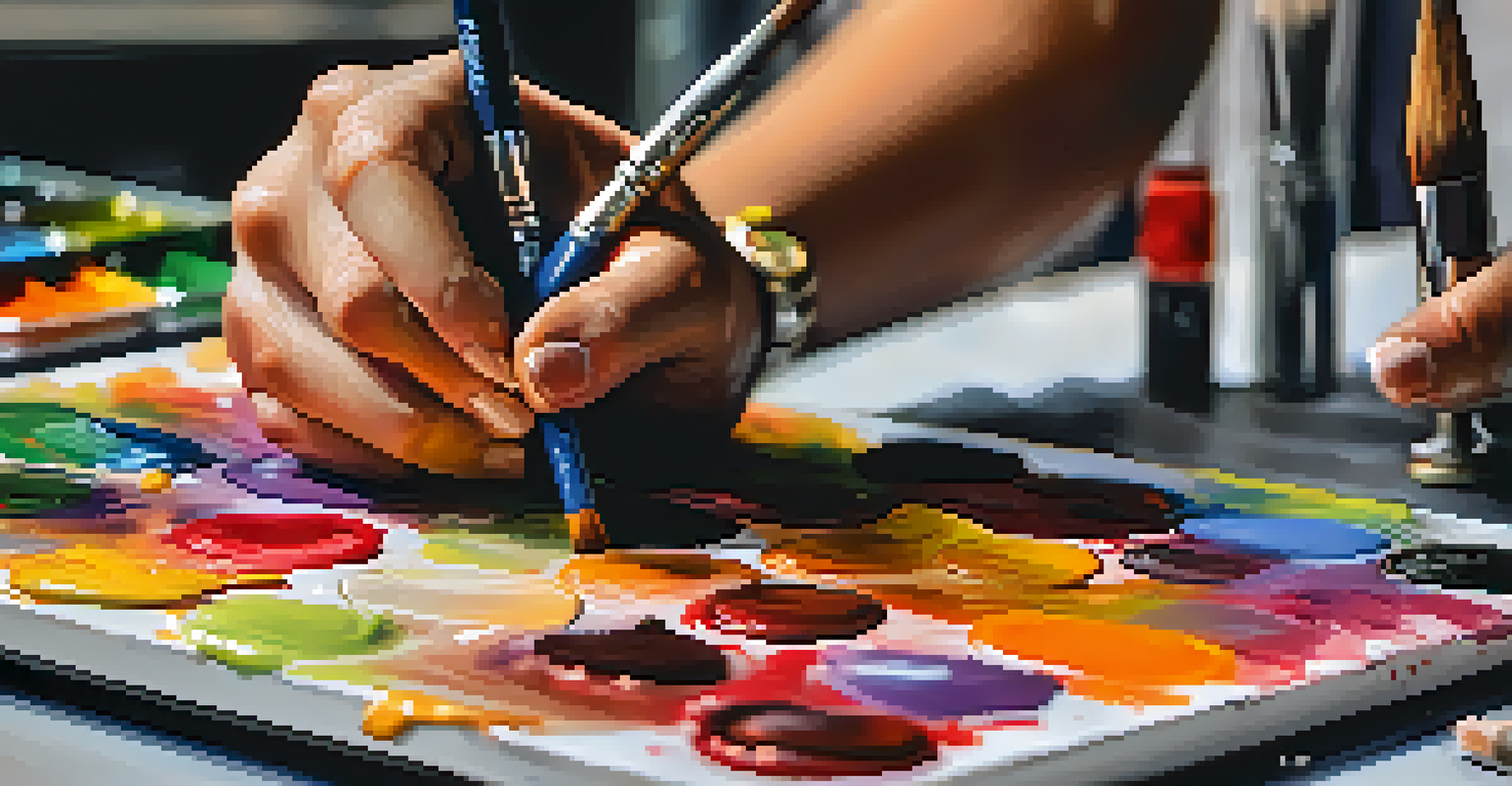Business Expenses: What Artists Can Deduct on Their Taxes

Understanding Business Expenses for Artists
As an artist, it's crucial to grasp what qualifies as a business expense. These are costs you incur while creating or promoting your art, and they can significantly impact your taxable income. Think of it like this: every dollar saved on taxes is more money to invest back into your craft.
Art is not what you see, but what you make others see.
Whether you paint, sculpt, or create digital art, many of your costs are likely deductible. This includes supplies, studio rent, and even certain travel expenses related to your art. By identifying these deductions, you can lower your tax burden while supporting your creative endeavors.
Understanding these expenses isn't just about saving money; it’s also about recognizing the value of your work. When you treat your art as a business, you position yourself for growth and sustainability in the long run.
Art Supplies: What You Can Deduct
One of the biggest expenses artists face is purchasing supplies. Whether it's paint, brushes, canvases, or software for digital artists, most of these costs are tax-deductible. Keeping receipts and records of your purchases can make it easier to claim these deductions come tax season.

It's important to note that the supplies must be directly related to your art. For instance, if you buy a new camera for photography, that cost is deductible. However, if you purchase a personal item that doesn't contribute to your art, it won't qualify.
Deductible Business Expenses
Understanding what qualifies as deductible business expenses can help artists reduce their taxable income and reinvest in their art.
By tracking your art supplies, you not only save money but also gain insight into your spending habits. This can help you make more informed decisions about budgeting and investing in your art practice.
Rent and Utilities for Your Art Space
If you rent a studio or workspace for your artistic endeavors, this expense is often fully deductible. This includes the rent you pay monthly, as well as utilities like electricity and water. Make sure to keep detailed records of these costs, as they can add up quickly.
The best way to predict the future is to create it.
If you work from home, you can deduct a portion of your home expenses related to your art. This is often calculated based on the square footage of your workspace compared to your entire home. For many artists, this can translate into significant savings come tax time.
Remember, the key is to ensure that the space is used primarily for your art. This way, you’re not just getting a tax break—you’re also treating your passion like a legitimate business.
Travel Expenses Related to Your Art
Travel can be a crucial part of an artist's life, whether you're attending exhibitions, visiting galleries, or sourcing inspiration. Fortunately, many travel-related expenses can be deducted. This includes transportation, lodging, and meals when you're traveling for art-related purposes.
To ensure your travel expenses are deductible, keep thorough documentation. This can involve saving your flight tickets, hotel receipts, and even noting the purpose of your trip. This way, you can prove that your travel was directly related to your art business.
Tracking Art Supplies Costs
Keeping detailed records of art supplies and related expenses not only aids in claiming deductions but also informs better budgeting decisions.
It's not just about saving money; it's about recognizing the importance of these experiences in your growth as an artist. Each trip can spark new ideas and directions for your work, making these deductions even more worthwhile.
Marketing and Promotion Costs
Promoting your art is essential for building an audience, and the associated costs can be deducted. This includes expenses for creating a website, printing business cards, or paying for social media advertising. These investments not only help you reach potential buyers but also reduce your taxable income.
Think of marketing as an investment in your future success. While it might seem like a cost upfront, effective promotion can lead to increased sales and visibility. Documenting these expenses ensures you can claim them when filing your taxes.
As an artist, your work deserves to be seen, and these deductions can help make that happen. By strategically investing in marketing, you’re not just promoting your art; you’re also cultivating a sustainable career.
Professional Development and Education
Investing in your skills is key to evolving as an artist, and many of these educational expenses can be deducted. Workshops, online courses, and even art conferences often qualify as business expenses. By enhancing your skills, you're not only improving your craft but also making a smart financial move.
Keep track of any educational materials, registration fees, or travel costs associated with these learning experiences. This documentation will help you substantiate your deductions and maximize your savings come tax time.
Investing in Professional Growth
Expenses for professional development and consulting services can be deducted, enhancing both artistic skills and financial management.
These investments in your development can open new doors in your artistic journey. The more you learn, the more you can grow, and that’s a benefit that goes beyond just tax savings.
Consulting and Professional Services
If you hire professionals to assist with your art business, such as accountants or marketing consultants, their fees can also be deducted. These services can provide valuable insights and help you navigate the complexities of running an art business, making them worthwhile investments.
Documenting these expenses is crucial. Save invoices and receipts to ensure you can substantiate these deductions when tax season rolls around. This attention to detail can lead to significant savings on your tax return.

Utilizing professional services can allow you to focus more on your art while experts handle the business side. This collaboration can enhance your overall success and ensure your financial health.
Final Thoughts on Deductions for Artists
Navigating the world of tax deductions can feel overwhelming, but understanding what you can claim is essential for your financial well-being. By recognizing and documenting your business expenses, you can significantly reduce your taxable income and free up resources for your art.
Remember, the goal is to treat your passion as a legitimate business. This mindset not only helps with financial management but also positions you for growth and success in your artistic career.
So, as you prepare for tax season, take the time to review your expenses and make sure you're claiming everything you can. With careful planning and organization, you can maximize your deductions and keep your creative journey flourishing.